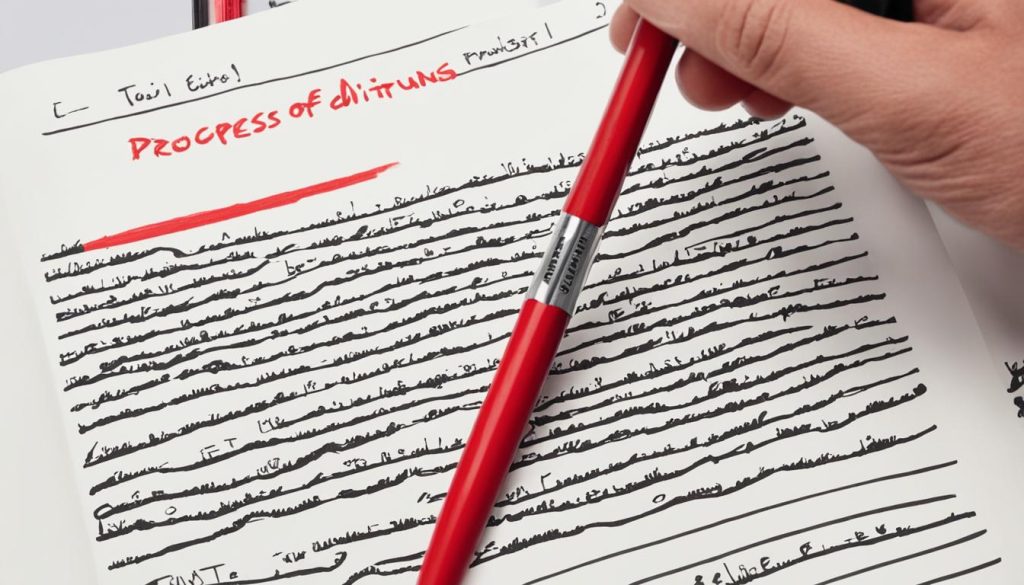How to Write Your First Book The Easy Way in 2024 – The Complete Guide
Writing your first book can be a daunting task, but with the right approach and guidance, it can be a rewarding and achievable endeavor. In this comprehensive guide, we will provide you with step-by-step instructions on how to write your first book the easy way in 2024. Whether you’re interested in writing a novel, nonfiction book, or memoir, we’ll cover all the essential tips, techniques, and strategies you need to know. From finding your writing motivation to building an outline and refining your manuscript, we’ll walk you through each stage of the book writing process. By the end of this guide, you’ll be equipped with the knowledge and confidence to embark on your writing journey and successfully publish your first book.
Key Takeaways:
- Gain the confidence and knowledge to write your first book
- Discover the essential tips and techniques for successful book writing
- Find your writing motivation and establish clear intentions
- Learn how to develop a compelling book idea and craft a premise
- Create a well-structured outline to guide your writing process
- Refine your manuscript through edits and constructive feedback
- Celebrate your success and explore options for book publication
Finding Your Writing Motivation and Establishing Intentions
Before you start writing your first book, it’s crucial to find your writing motivation and establish clear intentions. By understanding your motivations and setting intentions, you’ll be able to stay committed and motivated as you work towards completing your book.
One of the keys to successful writing is finding intrinsic motivation. Ask yourself: What drives you to write? Is it the desire to share your story, educate others, or simply the joy of creative expression? Identifying your writing motivation will help fuel your passion and keep you dedicated to the writing process.
Additionally, setting clear intentions can provide a roadmap for your writing journey. Consider what you hope to achieve with your book. Are you writing to entertain, inspire, or challenge readers? Establishing your intentions will help guide your writing and ensure that your book aligns with your goals.
Alongside motivation and intentions, setting writing goals is essential. By breaking down your book writing journey into smaller milestones, you’ll have a clear path to follow and a sense of progress. Whether it’s completing a certain number of chapters each week or reaching a specific word count, writing goals can help you stay accountable and focused.
Furthermore, developing a writing routine can provide structure and consistency to your writing practice. Find a time and place where you can dedicate uninterrupted focus to your writing. Whether it’s early mornings, late nights, or during your lunch break, establish a routine that works best for you. By writing regularly, even if it’s just for a short amount of time, you’ll maintain momentum and make progress on your book.
Despite our best efforts, writer’s block can sometimes hinder our progress. It’s important to remember that experiencing writer’s block is normal and temporary. When faced with a creative block, try exploring different writing techniques or engaging in activities that inspire you. Taking breaks, journaling, or seeking feedback from trusted peers can help overcome writer’s block and get your creativity flowing again.
Remember, writing is a journey. It’s not always easy, but by finding your motivation, setting intentions, establishing writing goals, developing a routine, and overcoming writer’s block, you’ll be well positioned to write your first book and achieve your writing aspirations.
| Key Strategies for Finding Writing Motivation and Establishing Intentions |
|---|
| 1. Reflect on your writing motivation and why you want to write a book. |
| 2. Set clear intentions for your book, considering what you hope to achieve with your writing. |
| 3. Establish writing goals to break down your book writing process into manageable steps. |
| 4. Develop a writing routine that works best for you and stick to it. |
| 5. Overcome writer’s block by exploring different writing techniques and seeking feedback from others. |
Developing Your Book Idea and Crafting a Premise
Developing a strong book idea is the foundation of any successful book. In this section, we’ll guide you through the process of cultivating fresh book concepts that will resonate with your readers. We’ll discuss techniques for brainstorming and generating ideas, as well as strategies for evaluating and selecting the most promising concept for your book.

Cultivating Fresh Book Concepts
When it comes to book idea development, it’s important to think outside the box. Start by immersing yourself in various genres and styles of literature to spark your imagination. Consider different perspectives, explore unique settings, and delve into captivating plots. The key is to cultivate fresh ideas that will captivate your readers and set your book apart from the rest.
Drafting Your Book’s Premise Statement
Once you have brainstormed various book ideas, it’s time to refine them into concise and compelling premise statements. A book premise statement is a concise summary of the essence of your book. It should convey the main conflict, characters, and overarching themes in a way that grabs the reader’s attention. Craft a premise statement that hooks your audience and leaves them eager to explore your book further.
Pinpointing Your Core Message and Goals
As you delve deeper into your book idea, it’s important to pinpoint the core message and goals you want to convey. Ask yourself what you want readers to take away from your book. Is there an underlying theme or moral you want to explore? Understanding your core message will give your writing a clear focus and purpose, allowing you to effectively communicate your ideas to your audience.
| Book Idea Development | Crafting a Premise | Fresh Book Concepts |
|---|---|---|
| Brainstorm different ideas | Refine ideas into a concise premise statement | Explore unique perspectives, settings, and plots |
| Evaluate and select the most promising concept | Create a premise that grabs the reader’s attention | Cultivate fresh ideas that set your book apart |
| Pinpoint core message and goals |
Writing Your First Book: Building an Outline and Structure
Building a well-structured outline is essential for writing your first book. A comprehensive book outline serves as a roadmap for your writing journey, providing a clear direction and ensuring a smooth flow from beginning to end. In this section, we’ll guide you through the process of outlining and structuring your book effectively.
Organizing chapters is a crucial step in creating a coherent narrative. By carefully arranging your chapters, you can enhance the overall structure and pacing of your book. Consider the logical flow of ideas, character development, and plot progression when deciding on the order and placement of each chapter.
Structuring the narrative is equally important. Pay attention to the plot development and the overall story arc to create an engaging reading experience. Map out the key events, conflicts, and resolutions to maintain the reader’s interest and ensure a satisfying payoff.
To visualize and organize your book’s structure, consider using visual aids such as mind maps, flowcharts, or plot diagrams. These tools can help you see the bigger picture and make adjustments as needed.
By following a solid outline and carefully structuring your book, you’ll have a solid foundation for your writing journey. Your book will have a clear direction and a cohesive narrative that captivates readers. Now that you have a strong foundation in place, it’s time to dive into the actual writing process and bring your story to life!
Refining Your Manuscript through Edits and Feedback
Once you have completed your manuscript, the next step is refining it through edits and feedback. This crucial stage of the writing process allows you to improve the overall quality and clarity of your work, ensuring that it resonates with your readers. In this section, we will discuss various strategies and techniques to help you refine your manuscript and enhance your writing skills.
Gathering Constructive Criticism from Trusted Sources
One of the most valuable resources for refining your manuscript is constructive criticism from trusted sources. By seeking feedback from writing groups, beta readers, and professional editors, you can gain valuable insights and perspectives that will help you identify areas for improvement. These trusted sources can provide objective feedback, pointing out both strengths and weaknesses in your writing.
Implement Techniques from Published Works
Another effective way to refine your manuscript is by implementing techniques from published works. By studying successful books in your genre, you can learn valuable lessons about storytelling, character development, pacing, and more. Analyze how your favorite authors engage readers, evoke emotions, and create memorable narratives. By incorporating these techniques into your own writing, you can elevate the quality of your manuscript.

Navigating the Iterative Process of Manuscript Revisions
The revision process is often an iterative one, requiring multiple rounds of edits and revisions to fine-tune your manuscript. It’s important to approach this process with patience and perseverance, as each revision brings you closer to creating a polished final product. Embrace feedback, make necessary changes, and continue to refine your writing until you are satisfied.
Throughout this process, focus on improving your writing skills. Pay attention to sentence structure, grammar, and punctuation. Polish your prose, aiming for clarity and precision. Consider the flow and organization of your ideas, ensuring a logical progression throughout your manuscript. By continually honing your writing skills, you will create a manuscript that captivates readers.
Conclusion
Congratulations on completing your first book! It’s been an incredible writing journey, and now it’s time to celebrate your success. You’ve poured your heart and soul into crafting a story that is uniquely yours, and you should be proud of this accomplishment.
As you reflect on your writing journey, remember that this is just the beginning. The next steps towards book publication are within your reach. You have two main options: self-publishing and traditional publishing. Self-publishing allows you to have full control over your book’s production and distribution, while traditional publishing offers the support and expertise of a publishing house. Consider the pros and cons of each path and choose the one that aligns with your goals and aspirations.
Building an author platform is another crucial aspect of your publishing journey. An author platform is a strategic way to establish your online presence and connect with your target audience. Create a website, engage with readers through social media, and explore different marketing strategies to promote your book effectively. Building an engaged and loyal readership will significantly enhance your chances of success.
As you venture forth, remember to continue refining your writing skills. Writing is a lifelong process of learning and growth. Seek feedback from trusted sources, study the works of successful authors, and never stop practicing your craft. Your dedication and perseverance will lead you towards becoming a successful author in the ever-evolving world of publishing.
FAQ
How do I find my writing motivation and establish intentions?
To find your writing motivation, set writing goals, develop a writing routine, and overcome writer’s block.
How do I develop a book idea and craft a premise?
Start by cultivating fresh book concepts through brainstorming, then draft a compelling premise statement that summarizes your book’s essence. Pinpoint your core message and goals to maintain a clear focus.
How do I build an outline and structure for my first book?
Create a comprehensive book outline that organizes chapters, structures your narrative, and develops your plot. This will serve as a roadmap for your writing journey.
How do I refine my manuscript through edits and feedback?
Gather constructive criticism from trusted sources such as writing groups, beta readers, and professional editors. Implement editing techniques and learn from published works. Navigate the iterative process of manuscript revisions to improve your writing skills.
What are the next steps after completing my first book?
Reflect on your writing journey and celebrate your success. Explore options for book publication, including self-publishing and traditional publishing. Build an author platform and market your book to reach your target audience.
Source Links
- https://thewritepractice.com/book-in-a-year/
- https://selfpublishing.com/how-to-write-a-book/
- https://milanote.com/guide/how-to-start-a-novel



